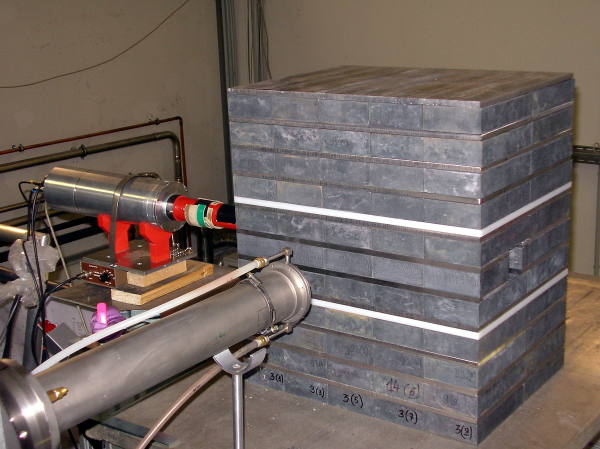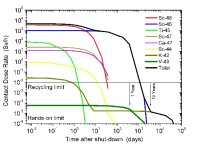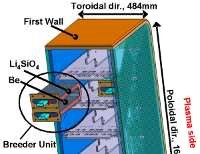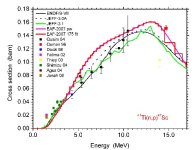Neutronics Experiments and related Computational Analyses
Computational tools and data need to be validated to ensure they give reliable results when applied in design calculations. This can be achieved through integral benchmark experiments and their computational analyses. In such experiments, suitable material assemblies are irradiated with 14 MeV neutrons and nuclear responses of interest are measured and compared to calculations which closely simulate the experimental set-up. For validating activation data, small material samples have to be irradiated in a well-characterized neutron field.
In the frame of the EFF (European Fusion File) and EAF (European Activation File) projects of the European Fusion Technology Programme, such benchmark experiments are conducted at the Frascati Neutron Generator (FNG) of ENEA, Italy, the Technical University Dresden, Germany, and the Nuclear Physics Institute (NPI), Rez, Czech Republic. The contribution of KIT/INR to this effort is on the experimental part as well as computational pre- and post-analyses of the benchmark experiments based on 3D Monte Carlo simulations and sensitivity/uncertainty calculations with the MCSEN code.
 Integral mock-up benchmark experiments
Integral mock-up benchmark experiments
Mock-up experiments focus on the measurement of nuclear responses in an assembly (for example a simplified model of a blanket or a block of a pure material) to study neutron transport in the materials and check particle/photon generation and transport data
 Activation experiments
Activation experiments
Integral activation experiments are relevant to validate material activation data which are important for designing maintenance procedures, licensing, and decommissioning
 Development of detectors and measurement methodology for harsh conditions
Development of detectors and measurement methodology for harsh conditions
Developing detectors and special measurement methodology is still necessary for currently conducted experiments such as shut-down dose rate measurements but will be essential for neutronics and neutronics-related measurements with next generation experimental fusion reactors such as ITER but also next generation fission reactors. Currently available measurement technology without any adjustments is mostly unsuitable due to much higher neutron fluxes and other experimental conditions such as high temperatures. However, such experiments are necessary to fill the gap between todays mock-up experiments and the first power fusion reactor usually refered to as "DEMO" ensuring the scalability of our computer models.
 Measurements of cross sections
Measurements of cross sections
are basic experimental activities delivering essential input to computer models used for the design of nuclear devices and the assessment of their performance as well as producing technical input to the licensing process and enable checking of nuclear model calculation
Our group is actively involved in two experimental facilities:
- Technical University of Dresden's neutron laboratory (several projects utilizing the DT neutron generator of TUD: detector and spectrometer development, test facility for foil activation spectrometer for ITER-TBM)
- Fast neutron, proton and deuteron activation facility at NFS / SPIRAL-2
We participate in and contribute to experiments at FNG (ENEA Frascati), JET (CCFE Culham), NPI Rez, PTB Braunschweig
